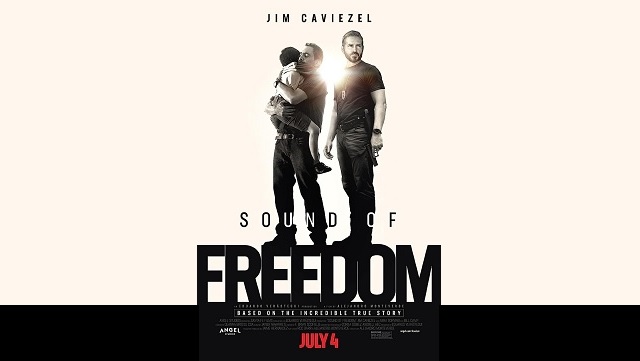‘Sound of Freedom’ with Jim Caviezel
By The Catholic Thing

Brad Miner reviews a new film about human trafficking – of children. It’s one reason why we know God’s plan includes Hell.
Had this been a poorly executed film, I’d have been tempted to praise it anyway because it’s about the criminal and sinful practice of kidnapping children and selling them as sex slaves. . . and because the estimable Jim Caviezel is the star. But it’s a good thriller featuring fine performances.
So here’s the story of director Alejandro Monteverde’s movie. (Mr. Monteverde is the director of the wonderful 2006 pro-life film, Bella.)
But first, the film features Mr. Caviezel, Mira Sorvino, José Zúñiga, Eduardo Verastegui, Gerardo Taracena, and Bill Camp (who gives the film’s best performance). It’s written by Mr. Monteverde and Rod Barr and produced by Mr. Verastegui.
Tim Ballard (Mr. Caviezel) leaves his position as a Special Agent with U.S. Homeland Security Investigations to become a freelance operative in order to rescue kidnapped kids from cartels, who, in turn, sell the children to human traffickers in Latin America, who, in turn, send them all over the world (including the United States) to be raped by pedophiles.
This is, as they say, based on a true story, which raises the question: Who is the real Tim Ballard? Two U.S. agencies won’t comment on Mr. Ballard’s employment. The Atlantic’s Tiffany Kaitlin writes that “spokespeople for the CIA and DHS said they could not confirm Ballard’s employment record without his written permission, which he did not provide.”
Perhaps Mr. Ballard sees no reason to reveal agency censures for some of the methods he may have employed that resemble those we see Caviezel use in the film. He may have been insubordinate – understandable given the legal restraints placed upon law enforcement, both tactically and geographically.
What is not in dispute is that Ballard founded Operation Underground Railroad (O.U.R.) in 2013, the purpose of which is to cross borders and rescue children held by those traffickers and pedophiles.
According to Wikipedia, O.U.R. has a “question mark rating” from a group called CharityWatch, “because the organization does not disclose financial information.” Interesting. I’ve never heard of CharityWatch, which a separate Wikipedia page notes has a staff of 5. However, the leading rating agency for non-profits is Candid, (200 employees), which operates GuideStar, the leading rater of philanthropies, 501(c)3 organizations, and other non-profits, and they have plenty of financial info on O.U.R. GuideStar rates non-profits as bronze, silver, gold, or platinum, and O.U.R. receives a silver rating. Executive salaries seem unusually high. But this isn’t the Boy Scouts. And some of O.U.R.’s staff risk their lives to accomplish the mission.
But back to the film.
As the credits roll, we see grainy black-and-white video of what appears to be actual security-camera footage of kids being snatched from streets and carried off in cars or motorcycles.
The movie’s dramatic portion begins with a scam talent agent (Cuban actress Yessica Borroto Perryman) recruiting children of various ages (but all minors) on the pretext of an audition. One unsuspecting dad (played by Mr. Zúñiga) drops off both of his excited kids at the audition: Rocio (a superb Cristal Aparicio, who must have been 15 or 16 during filming but looks pre-teen) and her younger brother.
Ballard is able to rescue the little brother in a sting at the U.S.- Mexico border, but there’s no sign of Rocio, which causes his break with DHS. He decides he simply cannot work within U.S. governmental legal restraints.
Along the way to finding where Rocio has been taken, he manages to liberate a remarkable number of kids by organizing a sting – a kind of Fantasy Island for pedophiles – with a former cartel member, Batman (Mr. Camp) and a wealthy risk-taker, Paul (Mr. Verastegui). But the search for Rocio goes on.
And it leads him into the rainforest camp of the drug lord El Alacrán (Mr. Taracena in a typically menacing performance). I won’t reveal how Ballard’s violent confrontation with El Alacrán ends.
I have only one concern about Mr. Monteverde’s direction: he wastes time on silence and faces, especially Mr. Caviezel’s. Silence, and faces, and darkness, this last a tried-and-true technique for disguising a modest budget. Even the blows struck in a fight sequence are blacked out entirely, although that may have been a way of avoiding an R rating.
The day after I saw the film, a friend sent me a New York magazine story titled, “The Damning Details That Led JPMorgan Chase to Settle with Epstein’s Victims.” Epstein, of course, is Jeffrey Epstein, whose friendship with entrepreneur Leslie Wexner, gave him entrée into the world of international finance.
(A personal note: Mr. Wexner’s association with Epstein saddens me. He is a graduate of Ohio State University and from the department where my late father was chairman when Les Wexner was a student. Wexner denies knowledge of Epstein’s pedophilia. I hope so, because his philanthropy, aiding Ohio State, specifically, and Central Ohio, generally, has been astonishing.)
I mention Epstein because the story of sex trafficking is bigger than many suppose. Its satanic tentacles reach deep into the corridors of wealth and power.
Newsweek has noted some of the men who traveled on Epstein’s private flights to the Caribbean (dubbed the Lolita Express). I won’t list them all, but they include Donald Trump, Bill Clinton, Prince Andrew, Bill Gates, and Robert F. Kennedy Jr. Newsweek adds that all these names (and others) have also been reported by CNN and AP.
Epstein is, in a way, a man like Theodore McCarrick. As you read about the way Epstein lived, you encounter the same postscript to his crimes as for McCarrick’s – a shrug and a wink: “Everybody knew.”
According to the Human Trafficking Institute, there are currently nearly 5,000,000 sex-trafficking victims of whom 1,000,000 are children, most of them girls.
The U.N. says human trafficking is a $32-billion business – that’s per year. Why, you might ask, would anybody engage in such criminal sin?
Well, with regard child prostitution, the answer is that a child’s pimp can make as much as $250,000 a year from one little girl, whom he will force to perform sex acts up to dozens of times a day.
I’ve been motivated by Sound of Freedom to look around at data – to think outside the box of the film. But I don’t want to wade further into that swamp, largely because the numbers from advocacy groups and law-enforcement agencies vary wildly. Cops may care about victims, but their data are mostly about arrests. Advocates may be sincere, but they’re looking for funding.
For a frightening look at the way some are attempting to normalize pedophilia, see Kimberly Ells’ book The Invincible Family.
I’m the father of sons, but I do have a granddaughter, and her precious life brings starkly to mind the unimaginable horror of this unholy. . .business. It explains why God’s plan includes Hell. And it also calls into question the Catholic Church’s move to separate itself from capital punishment.
Sound of Freedom is rated PG-13. Angel Studios, of The Chosen fame, is the film’s distributor.
Tickets may be purchased online ahead of the July 4th premiere.
You may also enjoy:
Matthew Hanley’s Add P to LGBT
James H. Toner’s Callused Consciences
AUTHOR
Brad Miner
Brad Miner is the Senior Editor of The Catholic Thing and a Senior Fellow of the Faith & Reason Institute. He is a former Literary Editor of National Review. His most recent book, Sons of St. Patrick, written with George J. Marlin, is now on sale. His The Compleat Gentleman is now available in a third, revised edition from Regnery Gateway and is also available in an Audible audio edition (read by Bob Souer). Mr. Miner has served as a board member of Aid to the Church In Need USA and also on the Selective Service System draft board in Westchester County, NY.
EDITORS NOTE: This Catholic Thing column is republished with permission. All rights reserved. © 2023 The Catholic Thing. All rights reserved. For reprint rights, write to: info@frinstitute.org. The Catholic Thing is a forum for intelligent Catholic commentary. Opinions expressed by writers are solely their own.

This article is courtesy of DrRichSwier.com, an online community of citizen journalists, academics, subject matter experts, and activists to express the principles of limited government and personal liberty to the public, to policy makers, and to political activists. Please visit DrRichSwier.com for more great content.

